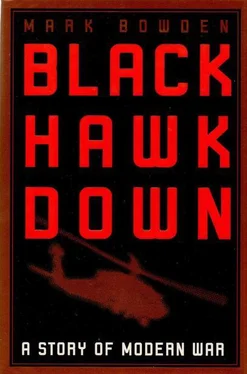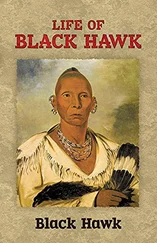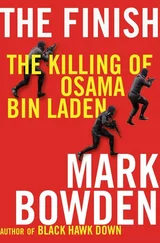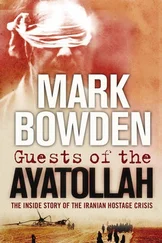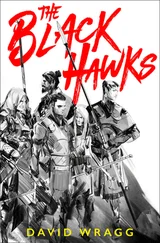Mark Bowden - Black Hawk Down
Здесь есть возможность читать онлайн «Mark Bowden - Black Hawk Down» весь текст электронной книги совершенно бесплатно (целиком полную версию без сокращений). В некоторых случаях можно слушать аудио, скачать через торрент в формате fb2 и присутствует краткое содержание. Город: New York, Год выпуска: 1999, ISBN: 1999, Издательство: Atlantic Monthly Press, Жанр: nonf_military, на английском языке. Описание произведения, (предисловие) а так же отзывы посетителей доступны на портале библиотеки ЛибКат.
- Название:Black Hawk Down
- Автор:
- Издательство:Atlantic Monthly Press
- Жанр:
- Год:1999
- Город:New York
- ISBN:978-0871137388
- Рейтинг книги:3 / 5. Голосов: 1
-
Избранное:Добавить в избранное
- Отзывы:
-
Ваша оценка:
- 60
- 1
- 2
- 3
- 4
- 5
Black Hawk Down: краткое содержание, описание и аннотация
Предлагаем к чтению аннотацию, описание, краткое содержание или предисловие (зависит от того, что написал сам автор книги «Black Hawk Down»). Если вы не нашли необходимую информацию о книге — напишите в комментариях, мы постараемся отыскать её.
Black Hawk Down — читать онлайн бесплатно полную книгу (весь текст) целиком
Ниже представлен текст книги, разбитый по страницам. Система сохранения места последней прочитанной страницы, позволяет с удобством читать онлайн бесплатно книгу «Black Hawk Down», без необходимости каждый раз заново искать на чём Вы остановились. Поставьте закладку, и сможете в любой момент перейти на страницу, на которой закончили чтение.
Интервал:
Закладка:
He was told, “If any harm comes to the pilot, the same shall be done to you.”
Durant arrived at night, angry, frightened and in pain. In the drive through the city he had been under a blanket in the backseat. He had no idea where he was. The men who brought him carried him up steps and along a walkway and set him down in a room.
Firimbi greeted him, but the pilot didn’t answer. Durant’s wounds, a compound-fractured right leg and a wounded shoulder, had become swollen and infected. Firimbi helped wash him and bandage his wounds. He passed word along that Durant needed a doctor.
That night, Monday, Oct. 4, Durant heard American helicopters flying overhead, broadcasting haunting calls:
“Mike Durant, we will not leave you.”
“Mike Durant, we are with you always.”
“Do not think we have left you, Mike.”
FORMER U.S. AMBASSADOR to Somalia Robert Oakley was at a party at the Syrian Embassy in Washington on Oct. 5 when he got a phone call from the White House. It was Anthony Lake, national security adviser to President Clinton.
“I need to talk to you first thing in the morning,” Lake said.
“Why, Tony?” Oakley said. “I’ve been home for six months.”
Oakley, a gaunt, plainspoken intellectual with a distinguished career in diplomacy, had been President George Bush’s top civilian in Mogadishu during the humanitarian mission that had begun the previous December and eventually ended the famine. He had left in March along with 20,000 Marines.
Since his return, Oakley had watched with dismay the course of events in Mogadishu. Despite his long experience there, no one from the White House or State Department had consulted him.
“Can you come to breakfast tomorrow at 7:30?” Lake asked.
The White House was in trouble. The day after the Oct. 3, 1993, Battle of Mogadishu, Secretary of Defense Les Aspin and Secretary of State Warren Christopher had been grilled by angry members of Congress. How had this happened? Why were American soldiers dying in far-off Somalia?
These were the same questions that Clinton was asking his aides. Until this raid, Clinton had been briefed on missions in advance. This one had been mounted so quickly he had not been informed. He complained bitterly to Lake. He felt he had been blindsided, and he was angry. He wanted answers to a broad range of questions from policy to military tactics.
At the breakfast table in the East Wing on Oct. 6 were Lake and his deputy, Samuel R. Berger, and U.S. Ambassador to the U.N. Madeleine K. Albright. Then they walked with Oakley into the Oval Office, where they joined the President, the vice president, Christopher, Aspin, the chairman of the Joint Chiefs of Staff, and several advisers.
The meeting lasted six hours. The thrust of the discussion was: What do we do now? An American soldier’s body had been dragged through the streets by jeering Somalis. Eighteen soldiers were dead and 73 wounded. Hundreds of Somalis were dead. Durant was being held captive. The public was outraged, and Congress was demanding withdrawal.
Staying in Mogadishu to pursue Aidid was out of the question, even though retired Adm. Jonathan Howe, head of the U.N. effort there, and Maj. Gen. William F. Garrison, commander of Task Force Ranger, thought Aidid had been struck a mortal blow, and that it wouldn’t take much to finish the job. Intelligence reports were that Aidid supporters were fleeing the city, their arsenals of rocket-propelled grenades expended. Others were sending peace feelers, offering to dump Aidid. But it was clear that America had lost its stomach for anything further in Somalia.
The meeting ended with a decision: America was pulling out. Task Force Ranger, reinforced to make a show of military resolve, would stay on—but would make a dignified withdrawal by March 1994. All efforts to capture Aidid would be called off.
Oakley was dispatched to Mogadishu to deliver this message and to try to secure the release of Durant.
There would be no negotiating with Aidid. Oakley was instructed to deliver a stern message: “The President of the United States wanted the pilot released. Now.”
JIM SMITH, the father of Ranger Cpl. Jamie Smith, was in a meeting at a bank in Long Valley, N.J., on Monday, Oct. 4, when, oddly, his boss’ wife walked into the conference room.
“I just got a call from Carol,” she said. “Call home.”
Obviously, his wife, Carol, had felt this was urgent. She had phoned the boss’ home number, looking for a way to track him down.
“What’s the matter?” he asked when Carol answered his return call.
Smith will always remember her next words.
“There are two officers here. Jamie has been killed. You have to come home.”
When Jim got home, Carol told him: “Maybe they’re wrong. Maybe Jamie is just missing.”
But Smith knew. He had been a Ranger captain in Vietnam, and lost a leg in combat. He knew that in a tight unit such as his son’s in Mogadishu, they wouldn’t notify the family of death unless they had his son’s body in hand.
“No,” he told his wife quietly, trying to make the words sink in. “If they say he’s dead, they know.”
Camera crews began to arrive within hours. When everyone in his immediate family had been given the news, Smith walked out in the front yard to answer questions. He was repulsed by the attitude of the reporters and the kinds of questions they asked. How did he feel? How did they think he felt? He told them he was proud of his son and deeply saddened. Did he think his son had been properly trained and led? Yes, his son was superbly trained and led. Whom did he blame? The U.S. Army? Somalia? God?
Smith told them that he didn’t know enough about what happened yet to blame anybody, that his son was a soldier, and that he died serving his country.
A Mailgram arrived two days later with a stark message signed by a colonel he didn’t know. It resonated powerfully with Smith, even though he knew its contents before reading the words. It joined him in a sad ritual as old as war itself, with every parent who ever lost a son in battle:
“THIS CONFIRMS PERSONAL NOTIFICATION MADE TO YOU BY A REPRESENTATIVE OF THE SECRETARY OF THE ARMY, THAT YOUR SON, SPC JAMES E. SMITH, DIED AT MOGADISHU, SOMALIA, ON OCTOBER 3, 1993. ANY QUESTIONS YOU MAY HAVE SHOULD BE DIRECTED TO YOUR CASUALTY ASSISTANCE OFFICER. PLEASE ACCEPT MY DEEPEST SYMPATHY IN YOUR BEREAVEMENT.”
STEPHANIE SHUGHART had finally received word about her husband, Randy Shugart, that Monday morning, Oct. 4, at Fort Bragg, N.C. She had called her boss to say she wouldn’t be in for work—"a family emergency.”
Her boss knew that Randy was in the Army, and she had heard the reports out of Mogadishu. She drove straight over to the Shugharts’ house.
The two women drank coffee and watched CNN. Stephanie had been in an agony of suspense since the day before, when one of the other Commando wives had spread the word: “One of our guys has been killed.” Stephanie and her boss were talking when two silhouettes appeared outside the door.
Stephanie opened it to two men from her husband’s secret Commando unit. One was a close friend. This is it, she thought.He’s dead.
“Randy is missing in action,” her friend said.
She was determined not to despair. Randy would be fine. He was the most competent man alive. Her mental image of Somalia was of a jungle. She pictured her husband in some clearing, signaling for a chopper. When her friend told her that Randy had gone in with Gary Gordon, she felt even better. They’re hiding somewhere. If anybody could come through it alive, it was those two.
Later that day notification arrived at Fort Bragg of more deaths: Sgt. Earl Fillmore and Master Sgt. Tim “Grizz” Martin. Then there were the horrible images of a dead soldier being dragged through the streets. Wives and parents and siblings were examining newspaper photos and squinting at TV images, trying to determine who the soldier was.
Читать дальшеИнтервал:
Закладка:
Похожие книги на «Black Hawk Down»
Представляем Вашему вниманию похожие книги на «Black Hawk Down» списком для выбора. Мы отобрали схожую по названию и смыслу литературу в надежде предоставить читателям больше вариантов отыскать новые, интересные, ещё непрочитанные произведения.
Обсуждение, отзывы о книге «Black Hawk Down» и просто собственные мнения читателей. Оставьте ваши комментарии, напишите, что Вы думаете о произведении, его смысле или главных героях. Укажите что конкретно понравилось, а что нет, и почему Вы так считаете.
